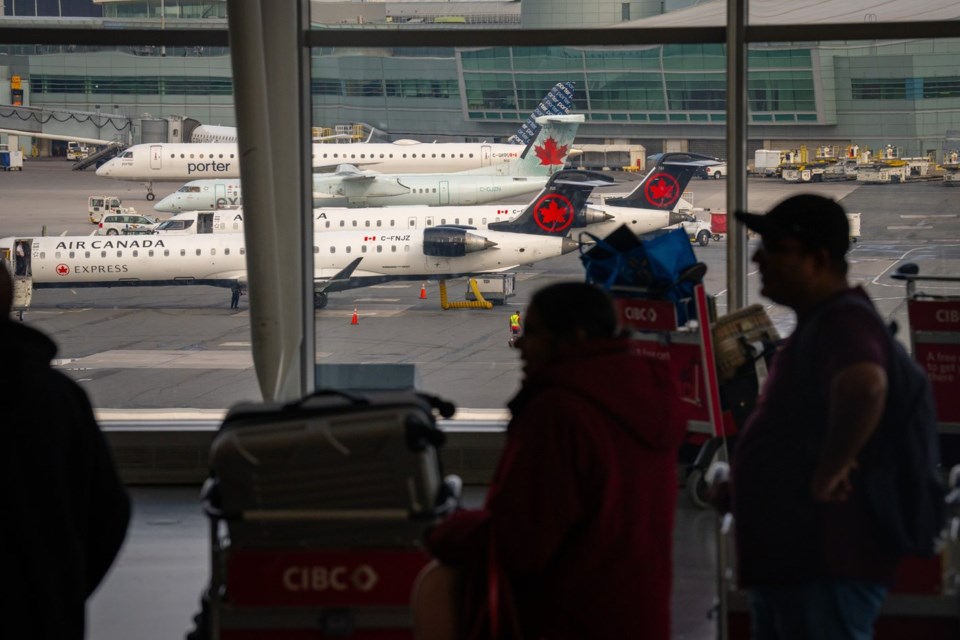A work stoppage looms for around 10,000 Air Canada flight attendants after their union and the airline issued 72-hour strike and lockout notices, respectively, early Wednesday morning.
Air Canada says it will begin cancelling flights that were scheduled to take off Thursday, with increasingly more disruptions by the weekend if a last-minute deal can't be reached before the work stoppage takes effect.
For summer travellers worried about what this means for their plans, here's what you need to know.
Have the strike and lockout started?
Not yet. The Air Canada component of the Canadian Union of Public Employees has signalled its intent to go on strike as of early Saturday morning.
That notice was issued just before 1 a.m. ET on Wednesday. Half an hour later, Air Canada issued a notice that it also plans to lock out flight attendants.
Such notices were required 72 hours in advance of any labour action. That means the work stoppage would officially begin Saturday around 1 a.m. if the two sides don't reach an 11th hour deal.
Will all Air Canada flights be cancelled?
A work stoppage will affect Air Canada’s main operations and Air Canada Rouge.
Air Canada said it will begin a gradual suspension of flights in advance of the strike deadline to allow an orderly shutdown leading up to Saturday.
The airline said the first flights will be cancelled Thursday, with more Friday and a complete stoppage by the weekend.
Flight attendants working for Jazz and PAL, which operate Air Canada Express flights, are not part of the negotiations. Flights under those banners will continue to operate as normal.
What should I know about my upcoming flight?
Air Canada has said it will notify customers via email and text message if their flights have been cancelled.
Affected customers will be eligible for a full refund, which can be obtained through Air Canada's website or mobile app.
The company also said it has made arrangements with other Canadian and foreign carriers to provide customers with alternative travel options to the extent possible. That includes passengers whose itineraries change mid-journey.
"Customers will be notified of alternative travel options that are identified for them," it said.
"However, given other carriers are already very full due to the summer travel peak, securing such capacity will take time and, in many cases, will not be immediately possible."
Air Canada added it is also implementing a flexible rebooking policy for all customers so they can change or defer travel at no additional cost.
The airline has cautioned that under Canada’s Airline Passenger Protection Regulations, customers are not eligible for compensation for delayed or cancelled flights, meals, hotels for situations outside the carrier's control, such as a strike or lockout.
How did we get here?
The two sides have been in contract talks since the start of the year, but concluded a conciliation process without reaching a deal.
On July 28, the union's strike mandate vote kicked off. It wrapped Aug. 5, with CUPE announcing its members voted 99.7 per cent in favour of a strike mandate.
At first, both sides seemed optimistic they could avoid a work stoppage despite the strong strike mandate. They returned to the bargaining table last Friday.
But on Tuesday, Air Canada said it had reached an "impasse" in negotiations with the union as the two sides were "far apart" on key issues. The union told its members that the company "decided they no longer want to negotiate."
CUPE said it had also rejected a proposal by Air Canada to enter a binding arbitration process. That would have suspended the union's right to strike, as well as Air Canada's right to lock out union members.
While Air Canada argued there was precedent to go that route, CUPE said it preferred to negotiate a contract that its members could then vote on.
The strike and lockout notices were issued hours later after talks broke down.
Air Canada has said it is looking into its remaining options, including a request for government-directed arbitration "to prevent a disruption or at least remove this intolerable uncertainty for our customers."
What is this dispute all about?
The union has said its main sticking points revolve around what it calls flight attendants' “poverty wages” and unpaid labour when planes aren't in the air. It told members it has put forward a proposal seeking cost of living enhancements each year, with a catch-up "to where we should be at for 2025."
CUPE said entry-level Air Canada flight attendants' wages have increased 10 per cent, or $3 per hour, over the past 25 years, which has been far outpaced by inflation.
It also said flight attendants are not paid "for a significant portion of their time on the job," such as when performing safety checks, attending to onboard medical and safety emergencies, and assisting passengers with boarding and deplaning.
Air Canada said its latest offer included 38 per cent total compensation increases over four years, including 25 per cent in the first year. It said that proposal also addressed the issue of ground pay, improved pensions and benefits, increased crew rest and other enhancements to work-life balance.
The airline said that offer would make its flight attendants the best compensated in Canada. But it said the union submitted a counter-offer "seeking exorbitant increases beyond those presented in earlier submissions."
This report by The Canadian Press was first published Aug. 13, 2025.
Companies in this story: (TSX:AC)
Sammy Hudes, The Canadian Press



